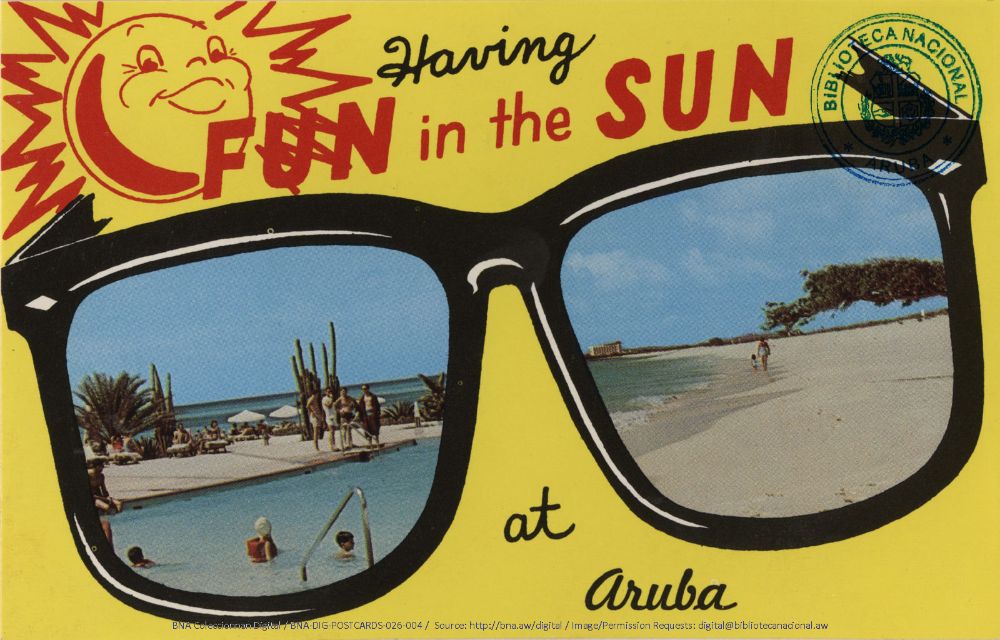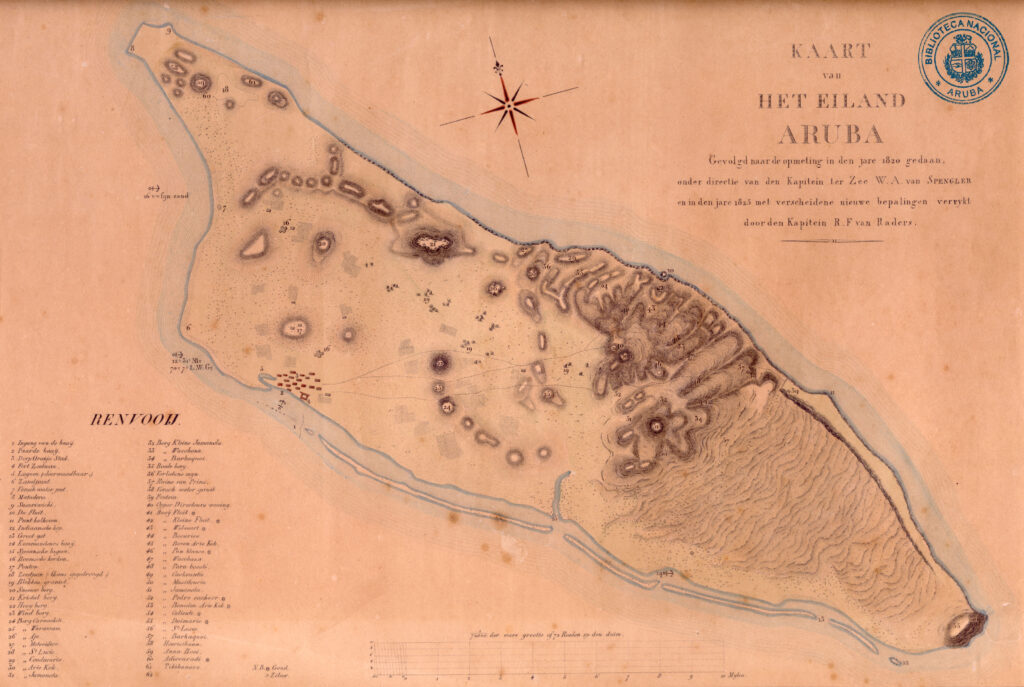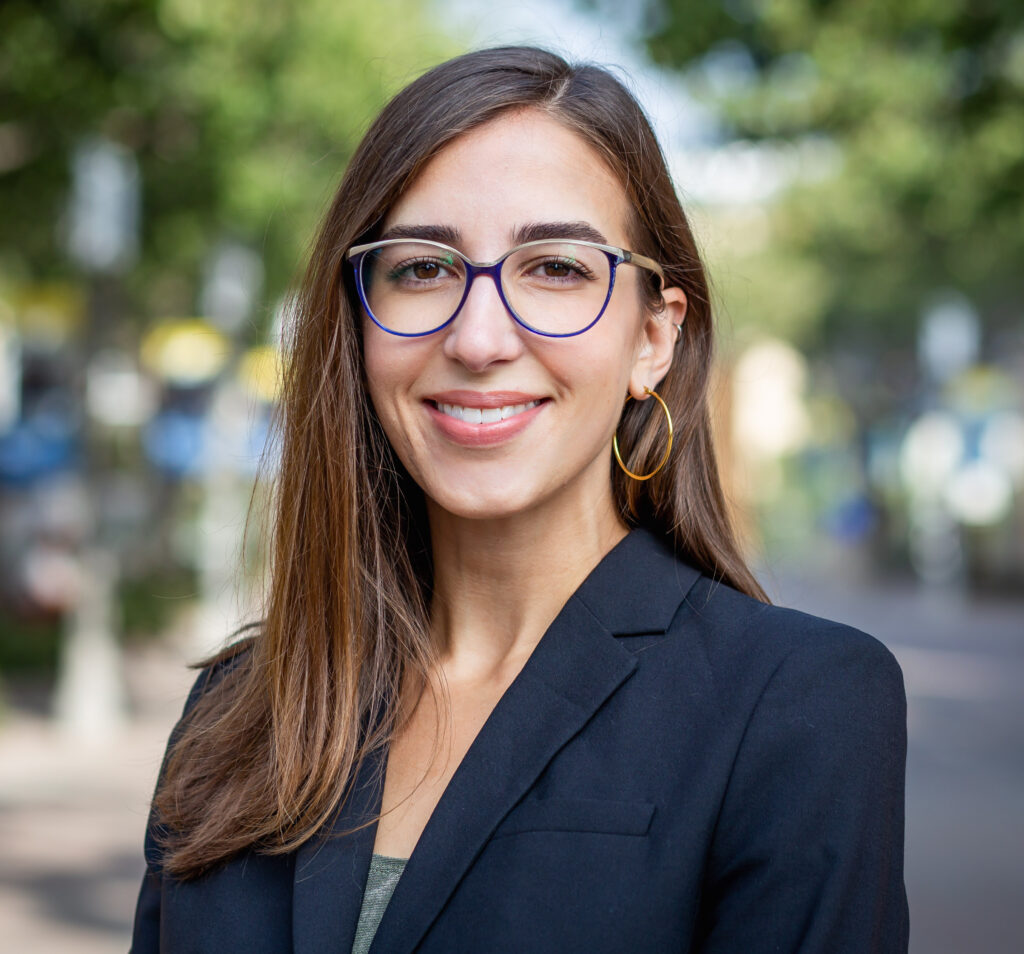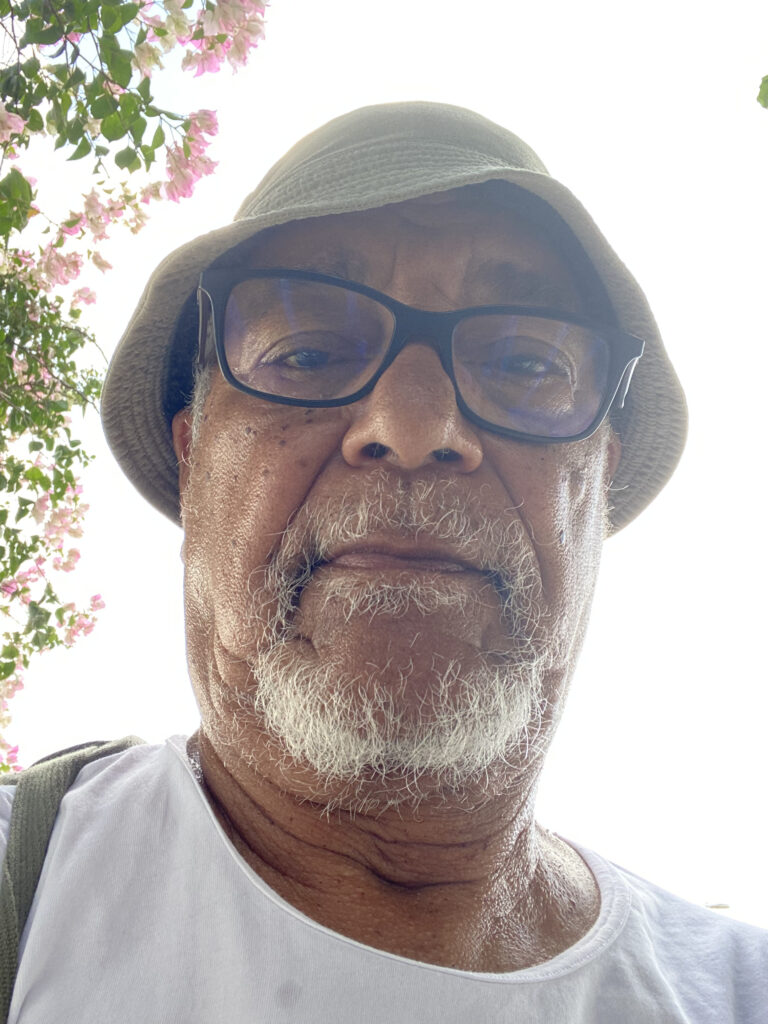
Many know Aruba as a popular tourist destination with beautiful beaches. The small island nation just north of Venezuela is also home to 110,000 inhabitants with a rich history—that many are working to preserve.
Aruba’s memory institutions have been digitizing materials for years. Initially, residents and international scholars could only view the items at the library on the island. But now with the help of Internet Archive, the Aruba Collection (Coleccion Aruba) is available to anyone for free from anywhere.
EXPLORE THE COLECCION ARUBA
A celebration of the heritage portal’s launch is being held via livestream on April 8.
COLLABORATION IS KEY
Digitizing the island’s historic materials was a collaborative effort. After Aruba became a country within the Kingdom of the Netherlands in 1986, the national library (Biblioteca Nacional Aruba; Aruba National Library – BNA) and the national archives (Archivo Nacional Aruba; National Archives of Aruba – ANA) were established. Leaders from the two institutions worked together to curate and scan artifacts including newspapers, government reports, and cultural items.
“Aruba has a challenging past due to migration, colonization, and slavery,” said Peter Scholing, information specialist/researcher at BNA, the national library. “That means there has been a diaspora of people coming in and spreading out throughout the world—the same goes for our collection and documents.”
Locating materials to digitize involved several local institutions on the island. Because the materials are scattered, Aruba has branched out to collaborate with others in the Caribbean, Venezuela, Netherlands and the United States. The local leaders established protocols and standards for the collection, but didn’t have enough resources to make the materials available in a robust digital library.

Connecting with the Internet Archive to host the digital collection provided the missing piece of the puzzle, according to leaders in Aruba. “Because of the reality of our small island state, we don’t have much funding for big company servers,” said Raymond Hernandez, head of the Aruba National Archives (ANA). “If you have a limited budget, it’s not possible. The dream has come true, thanks to the Internet Archive. We are very grateful.”
The new portal on the Internet Archive devoted to Aruba includes links to the several other institutions such as UNOCA (Union di Organisacionnan Cultural Arubano (UNOCA), Museo Arkeologico Nacional Aruba (MANA); National Archaeological Museum Aruba; Stichting Monumentenfonds Aruba (SMFA); Monuments Fund of Aruba), Departamento di Cultura Aruba, University of Aruba, TeleAruba and UNESCO Aruba.
EXPLORE THE COLECCION ARUBA
The collection has more than 100,000 items to date — nearly a one-to-one ratio for the island’s population. This includes about 40,000 documents, 60,000 images, 900 videos, 45 audio files and seven 3D objects for a total of 67 thematic and/or institutional (sub)collections.
As an additional layer of protection, the materials are being uploaded to the Filecoin decentralized storage network, thanks to a longstanding relationship between the Internet Archive and Filecoin Foundation for the Decentralized Web (FFDW).
[See paper on the Aruba Model – Coleccion Aruba: Intersectoral Collaboration on Aruba as a Model for the (Dutch) Caribbean : A collaborative approach for preservation and access of collections in small island states]
RESEARCH USE OF THE COLLECTION
For Chelsea Schields, associate professor of history at the University of California, Irvine, the materials were so compelling and easy to use that she integrated them into her undergraduate course, “Oil and Capitalism.” Students learn about the global history of petroleum and develop research skills to build an argument based on evidence. “Students use the Aruba Collection to write research papers related to the culture of oil towns,” Schields said. “It is often their favorite part of the course because they get to dig into the sources themselves and identify the themes that resonate across those materials.”
Unlike other primary source collections, which are often cumbersome and hidden behind a costly paywall, the diverse sources found enabled students to write papers on topics ranging from migrant domestic workers in Aruba to the spatial organization of oil towns.
In her own research for a book on the social histories of oil refineries on Aruba and Curaçao, Schields said the Aruba heritage portal was extremely useful when the COVID-19 pandemic restricted travel in the summer of 2020. “The Aruba Collection provided such an indispensable, bottom-up portrait of the history of the island’s Lago Refinery, which at its peak was among the largest plants in the world,” she said. “From photographs of refinery workers and their families to digitized copies of employee publications, these sources allowed me to see the labor required to transform oil into the commodities we rely upon today.”
Since the launch of Coleccion Aruba, Adi Martis said he uses the website almost every day. The emeritus associate professor at Utrecht University in The Netherlands appreciates how easy it is to access a variety of materials in national archives and the national library collections. For example, by combining data from digitized historical maps and land ownership register books from the Aruban Land Registry, users can gain an insight into the history of land ownership on the island, he said.
By applying AI-based, Handwritten Text Recognition (HTR) algorithms, the digitized, difficult-to-read handwritten texts are made accessible to the public and transformed into searchable data. Martis said in some cases, digitized archives from Aruba, Curaçao and the Netherlands are combined and search results are sometimes surprising—in particular with data about the history of slavery. Users can search using different keywords and the site can even create family trees, which normally can be difficult because the slaves had no surnames.
“For the past 50 years I have been doing archival research and I must admit that I am proud of my small island that was able to achieve such incredible results in such a short time with the help of Internet Archive,” Martis said.
Jan Bant, a doctoral student in history from Aruba who lives in The Netherlands, relied heavily on the Coleccion Aruba when doing research for his master’s thesis in 2020 during the COVID-19 lockdown. Although he was unable to return to the island, he accessed journals and newspaper articles from Europe to examine Aruba’s political climate between in the 1970s and 80s. Being able to enter key words and dates in the search function was particularly helpful in locating sources. Bant was able to uncover documents about protests, revealing the country’s somewhat radical traditions of commenting on world affairs despite its image as a calm player in the Caribbean, he said.
As Bant continues his PhD research on the role of sports in Dutch Caribbean communities, he is tapping into the Coleccion Aruba, including materials about the oil refinery and laborers who brought baseball to the island.
Bant contributed back to the portal by uploading his completed master’s thesis, which was completed in 2021. “There is a lot of research about Aruba that gets written but it’s never really used—often because people don’t know where to find it,” Bant said. “The Aruba Collection can also serve well as a repository to store research that has been done about Aruba. That’s what I think is very valuable.”
SERVING PATRONS
Aruba’s UNOCA Managing Director Ray-Anne Hernandez said the heritage portal allows users to easily search her foundation’s work of arts and culture. Researchers now can go to one place to locate digitized images and documents.
“We have collections that we want to share and have accessible to the public, so this was a logical step to be part of this collaboration,” Hernadez said. “In the collection, we have history. We have art, music, and education. It’s so much more than we initially thought it would be and that fills us with great pride and great joy. It’s not just that we made a website. It’s something that’s continually growing and everybody is using it.”
The Dutch Caribbean Digital Heritage Week will be held on Aruba April 8-12. For the first day, April 8, a day-long symposium is planned, titled “Connecting our Shared Heritage: Linking (Dutch) Caribbean Heritage Institutions and Collections”, with keynote speeches from Brewster Kahle (Internet Archive), Eppo van Nispen (Dutch Network for Digital Heritage NDE and Netherlands Institute for Sound and Vision), and contributions from a wide range of heritage professionals from across the Dutch Caribbean, and the world. It will be livestreamed via https://coleccion.aw/stream.
[Editorial note: For another take on the Coleccion Aruba, see, “The Internet Archive Just Backed Up an Entire Caribbean Island” from Wired.]


Kudos to Aruba for embracing technology to preserve and share its rich history and culture with the world! This Digital Heritage Portal is a fantastic initiative that not only honors the past but also opens doors for global appreciation and understanding. Excited to explore and learn more about Aruba’s fascinating heritage